| Listing 1 - 10 of 10 |
Sort by
|
Book

Year: 2007 Publisher: Leuven LannooCampus
Abstract | Keywords | Export | Availability | Bookmark
 Loading...
Loading...Choose an application
- Reference Manager
- EndNote
- RefWorks (Direct export to RefWorks)
In het biomedisch onderzoek zijn fascinerende wetenschappelijke ontwikkelingen aan de gang. We hebben het menselijke genoom ontrafeld, doorgronden de oorzaken van steeds meer ziekten en nieuwe technologieën waarmee het functioneren van ons lichaam gemakkelijker kan worden afgelezen, dienen zich aan. Wat zal de impact zijn van deze ontwikkelingen op onze toekomstige gezondheidszorg? Wat is hype en wat is hoop? Dit boek tracht een aantal van deze ontwikkelingen te duiden. De aandacht gaat hier niet naar ziekten die het gevolg zijn van infecties van buitenaf. De focus ligt op de aandoeningen die het gevolg zijn van het niet meer of onvoldoende functioneren van cellen en weefsels in ons lichaam. Verouderingsprocessen spelen hierin een rol. Veroudering begint overigens al op de dag dat je geboren wordt. Dit boek richt zich tot iedereen die zich meer wil verdiepen in deze biomedische ontwikkelingen en de betekenis ervan wil begrijpen. Je verneemt hoe gerenommeerde deskundigen de toekomst inschatten en van welke zaken ze vermoeden dat ze echt zullen doorzetten.
W 20.5 Medical research (General) --- Health --- Biomedical Research
Book
ISBN: 9789290612049 Year: 2003 Publisher: Genève ; Manille Organisation mondiale de la santé
Abstract | Keywords | Export | Availability | Bookmark
 Loading...
Loading...Choose an application
- Reference Manager
- EndNote
- RefWorks (Direct export to RefWorks)
Cette nouvelle édition, entièrement révisée, du manuel, répond aux demandes des utilisateurs qui souhaitent y retrouver le reflet des derniers développements en matière de méthodologie de la recherche et des enseignements tirés de l'expérience des cours de formation. Il s'agit d'un manuel pratique dédié à la formation, qui traite des concepts de base et des principes de la recherche scientifique, depuis le choix des objectifs et du plan d'étude, la réalisation des études et des essais, jusqu'à l'analyse des données et la présentation des résultats. Adapté aussi bien aux cours de formation collectifs qu'à l'auto-apprentissage, ce manuel est destiné aux jeunes scientifiques travaillant dans le domaine de la santé qui s'initient à la recherche et ont besoin de comprendre les étapes essentielles d'un plan de recherche : comment traduire une idée de recherche en une proposition de recherche faisable ; quelles sont les démarches à accomplir ensuite pour mettre en oeuvre l'étude proposée. Ce manuel fait constamment appel aux données réelles de projets de recherche consacrés aux problèmes rencontrés en sciences de la santé pour illustrer les principes et les méthodes. Le manuel se décline en onze modules de formation qui partent d'une explication des principes de base de la méthodologie scientifique pour passer à l'évaluation critique des plans d'études épidémiologique, expérimentale et clinique et aux chapitres traitant du biais et de la confusion, de la mesure de la fiabilité, des tests de signification et de l'établissement d'une association et de la causalité.
W 20.5 Medical research (General) --- Research methods --- Research Design --- Education Research --- Health Services
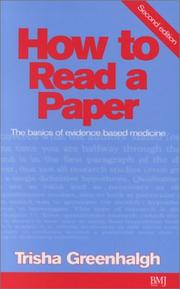
ISBN: 9780727915788 Year: 2000 Publisher: London BMJ Publishing Group
Abstract | Keywords | Export | Availability | Bookmark
 Loading...
Loading...Choose an application
- Reference Manager
- EndNote
- RefWorks (Direct export to RefWorks)
W 20.5 Medical research (General) --- Evidence-Based Medicine --- Research --- Reading
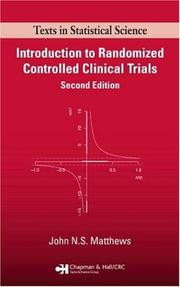
ISBN: 1584886242 Year: 2006 Publisher: London Chapman & Hall
Abstract | Keywords | Export | Availability | Bookmark
 Loading...
Loading...Choose an application
- Reference Manager
- EndNote
- RefWorks (Direct export to RefWorks)
Evidence from randomized controlled clinical trials is widely accepted as the only sound basis for assessing the efficacy of new medical treatments. Statistical methods play a key role in all stages of these trials, including their justification, design, and analysis. This second edition of Introduction to Randomized Controlled Clinical Trials provides a concise presentation of the principles applied in this area. It details the concepts behind randomization and methods for designing and analyzing trials and also includes information on meta-analysis and specialized designs, such as cross-over trials, cluster-randomized designs, and equivalence studies.This latest edition features new and revised references, examples, exercises, and a new chapter dedicated to binary outcomes and survival analysis. It also presents numerous examples taken from the medical literature, contains exercises at the end of each chapter, and offers solutions in an appendix. The author uses Minitab and R software throughout the text for implementing the methods that are presented.Comprehensive and accessible, Introduction to Randomized Controlled Clinical Trials is well-suited for those familiar with elementary statistical ideas and methods who want to further their knowledge of the subject.
W 20.5 Medical research (General) --- Research Design --- Statistics --- Randomized Controlled Trials
Book
Year: 2012 Publisher: Brussels KCE = Federaal Kenniscentrum voor de Gezondheidszorg = Centre Fédéral d'Expertise des Soins de Santé = Belgian Health Care Knowledge Centre
Abstract | Keywords | Export | Availability | Bookmark
 Loading...
Loading...Choose an application
- Reference Manager
- EndNote
- RefWorks (Direct export to RefWorks)
2011-20 --- Delphi Technique --- Focus Groups --- Observation --- Qualitative Research --- R187 --- W 20.5 Medical research (General)
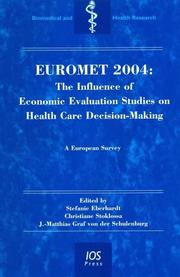
ISBN: 1586035290 Year: 2005 Publisher: Amsterdam IOS Press
Abstract | Keywords | Export | Availability | Bookmark
 Loading...
Loading...Choose an application
- Reference Manager
- EndNote
- RefWorks (Direct export to RefWorks)
This publication focuses on the impact of health economic evaluation studies on decision-making in nine European countries (Austria, Finland, France, Germany, Great Britain, Norway, Portugal, Spain and the Netherlands). EUROMET 2004: The Influence of Economic Evaluation Studies on Health Care Decision-Making reports on the results of a project called 'European Network on methodology and Application of Economic Evaluation Techniques' (EUROMET). On the one hand, the study showed an increasing number of economic evaluation studies, but on the other hand the availability of data and lack of expertise were seen as special barriers which limited the use of economic evaluation studies in the decision-making process. Economic evaluation studies had, before 2000, no major influence on healthcare decision-making in most European countries. In addition, the knowledge of healthcare decision-makers and of professionals in payer's organizations such as health insurers, sickness funds and regional budget fund holders was low or nearly not existing. Especially structural barriers are emphasised in this study. The respondents believe that increasing flexibility of healthcare budgets from one sector to another would encourage the transferability of economic study results. EUROMET focuses on the question of how sensitive decision makers are to economic evaluation study results in 2004 - with special emphasis on pharmaceuticals - and to what extent they admit to base their decisions on these results.
W 20.5 Medical research (General) --- Europe --- Statistics --- Evaluation Studies as Topic --- Decision Making --- Delivery of Health Care --- Economics --- Interdisciplinary Communication
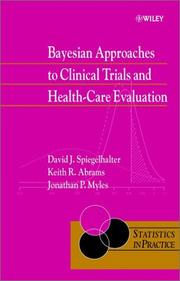
ISBN: 0471499757 9780471499756 Year: 2004 Publisher: Chichester John Wiley
Abstract | Keywords | Export | Availability | Bookmark
 Loading...
Loading...Choose an application
- Reference Manager
- EndNote
- RefWorks (Direct export to RefWorks)
The Bayesian approach involves collecting data from past experience in order to reach conclusions about future events. Bayesian methods have become increasingly popular in recent years, notably in medical research. There are a large number of books on Bayesian analysis, but very few that cover clinical trials and biostatistical applications in any capacity. There is no book available that is introductory in nature and covers such a broad array of essential topics.This book provides a valuable overview of this rapidly evolving field, not only for statisticians in the pharmaceutical industry, but also to anyone involved in conducting clinical trials and HTA work. Comprehensive coverage of Bayesian methods in medical research Illustrated throughout by case studies and worked examples Authors are at the forefront of research into Bayesian methods in medical research Suitable for those with a limited statistical background Accompanied by a Web site featuring data sets and worked examples in WinBUGS - the most widely accepted Bayesian modelling package
W 20.5 Medical research (General) --- Clinical Trials --- Technology Assessment, Biomedical --- Decision Support Techniques --- Bayes Theorem --- Bayesian statistical decision theory --- Medicine --- Clinical trials --- Research --- Statistical methods --- Bayesian statistical decision theory. --- Statistical methods. --- Bayes' solution --- Bayesian analysis --- Statistical decision --- Health Workforce --- Medicine - Research - Statistical methods --- Clinical trials - Statistical methods
Book
ISBN: 9780470656389 1283295326 9786613295323 1119959845 1119959810 Year: 2012 Publisher: Oxford Wiley-Blackwell
Abstract | Keywords | Export | Availability | Bookmark
 Loading...
Loading...Choose an application
- Reference Manager
- EndNote
- RefWorks (Direct export to RefWorks)
A considerable number of journal publications using a range of qualitative synthesis approaches has been published. Mary Dixon-Woods and colleagues (Mary Dixon-Woods, Booth, & Sutton, 2007) identified 42 qualitative evidence synthesis papers published in health care literature between 1990 and 2004. An ongoing update by Hannes and Macaitis (2010)identified around 100 additional qualitative or mixed methods syntheses. Yet these generally lack a clear, detailed description of what was done and why (Greenhalgh et al, 2007; McInnes & Wimpenny, 2008) . Choices are most commonly influenced by what others have successfully used in the past or by a particular school of thought (Atkins et al, 2008; Britten et al, 2002). This is a substantive limitation.This book brings balance to the options available to researchers, including approaches that have not had a substantial uptake among researchers. It provides arguments for when and why researchers or other parties of interest should opt for a certain approach to synthesis, which challenges they might face in adopting it and what the potential strengths and weaknesses are compared with other approaches.This book acts as a resource for readers who would otherwise have to piece together the methodology from a range of journal articles. In addition, it should stimulate further development and documentation of synthesis methodology in a field that is characterized by diversity.
Qualitative Research --- Methods --- Research --- Medicine --- Biomedical Research --- W 20.5 Medical research (General) --- #SBIB:303H30 --- Kwalitatieve methoden: algemeen --- Biology --- Qualitative research --- Qualitative analysis (Research) --- Qualitative methods (Research) --- Clinical sciences --- Medical profession --- Human biology --- Life sciences --- Medical sciences --- Pathology --- Physicians --- Biomass --- Life (Biology) --- Natural history --- Research&delete& --- Methodology --- Health Workforce --- Meta-Analysis as Topic. --- Qualitative Research. --- Qualitative research. --- Methodology. --- Methods. --- kvalitative forskningsmetoder --- evidensbaseret medicin --- systematiske oversigtsartikler --- systematic reviews --- mixed method --- kvantitativ forskning
Book
ISBN: 9789020731798 9020731793 Year: 2005 Publisher: Groningen Stenfert Kroese
Abstract | Keywords | Export | Availability | Bookmark
 Loading...
Loading...Choose an application
- Reference Manager
- EndNote
- RefWorks (Direct export to RefWorks)
'Basisboek Kwalitatief Onderzoek' is een onmisbare leidraad als u efficiënt en adequaat geïnformeerd wil worden over de ins en outs van kwalitatief empirisch onderzoek. Al snel kunt u overgaan tot het daadwerkelijk opzetten en uitvoeren van een kwalitatief onderzoek. Aan de didactische opbouw van dit boek is veel aandacht besteed. Uitgangspunt vormt een schematisch overzicht van alle fasen die u in een kwalitatief onderzoek doorloopt. Elke onderzoeksfase is in een apart hoofdstuk uitgewerkt aan de hand van een beslissingsschema. Deze schema's passen goed bij het cyclische karakter dat kenmerkend is voor veel kwalitatief onderzoek.
Methoden en technieken --- Speciale methoden. --- Sociaal-wetenschappelijk onderzoek. --- Wetenschappelijk onderzoek. --- 303 --- #SBIB:303H30 --- #KVHB:Methodologie --- #KVHB:Wetenschappelijk onderzoek --- 001 --- 301.081 --- 300.6 --- kwalitatief onderzoek --- sociaal-wetenschappelijk onderzoek --- 003 --- interview --- onderzoeken --- onderzoeksmethoden --- rapporteren --- statistiek --- wetenschappelijk onderzoek --- 001.891 --- Research (onderzoek) --- 001 )* Wetenschappelijke onderzoeksmethoden --- 303.100 --- Interviewen --- Kwalitatief onderzoek --- Sociaal-wetenschappelijk onderzoek --- Wetenschappelijk onderzoek --- Methodiek --- S20080046.JPG --- sociaal onderzoek --- 303 Methoden bij sociaalwetenschappelijk onderzoek --- Methoden bij sociaalwetenschappelijk onderzoek --- Kwalitatieve methoden: algemeen --- Wetenschap --- Kwalitatieve sociologische onderzoeksmethoden --- sociaal wetenschappelijk onderzoek --- Wetenschappelijk onderzoek; algemeen --- 301.08 --- Science policy --- Qualitative methods in social research --- interviewtechnieken --- Study methods --- W 20.5 Medical research (General) --- Research methods --- Research Design --- Research --- Education --- Social sciences --- Wetenschapsbeleid --- Studiemethodiek --- #KVHA:Methodologie --- #KVHA:Onderzoeksmethodologie --- #KVHA:Statistiek --- methodologie --- Professionalisering --- kunstonderwijs --- onderzoek in de kunsten --- onderzoek --- onderwijs --- 001.8 --- dissertaties --- essays --- heuristiek --- papers --- kwalitetitszorg --- scripties --- verhandelingen --- Methodologie --- Technieken --- Onderzoek --- Ontwikkeling --- Leerlijn --- Onderzoek (wetenschap)
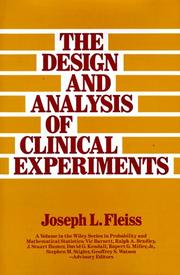
ISBN: 0471820474 0471349917 9780471349914 9780471820475 Year: 1986 Publisher: New York Wiley
Abstract | Keywords | Export | Availability | Bookmark
 Loading...
Loading...Choose an application
- Reference Manager
- EndNote
- RefWorks (Direct export to RefWorks)
Clinical chemistry --- Clinical Trials --- Mathematics --- Research Design --- Statistics --- methods --- Clinical Trials as Topic --- Mathematics. --- Research Design. --- Statistics as Topic. --- Clinical medicine --- -Clinical trials --- -Controlled clinical trials --- Patient trials of new treatments --- Randomized clinical trials --- Trials, Clinical --- Human experimentation in medicine --- Medicine, Clinical --- Medicine --- Area Analysis --- Correlation Studies --- Correlation Study --- Correlation of Data --- Data Analysis --- Estimation Technics --- Estimation Techniques --- Indirect Estimation Technics --- Indirect Estimation Techniques --- Multiple Classification Analysis --- Service Statistics --- Statistical Study --- Statistics, Service --- Tables and Charts as Topic --- Analyses, Area --- Analyses, Data --- Analyses, Multiple Classification --- Analysis, Area --- Analysis, Data --- Analysis, Multiple Classification --- Area Analyses --- Classification Analyses, Multiple --- Classification Analysis, Multiple --- Data Analyses --- Data Correlation --- Data Correlations --- Estimation Technic --- Estimation Technic, Indirect --- Estimation Technics, Indirect --- Estimation Technique --- Estimation Technique, Indirect --- Estimation Techniques, Indirect --- Indirect Estimation Technic --- Indirect Estimation Technique --- Multiple Classification Analyses --- Statistical Studies --- Studies, Correlation --- Studies, Statistical --- Study, Correlation --- Study, Statistical --- Technic, Estimation --- Technic, Indirect Estimation --- Technics, Estimation --- Technics, Indirect Estimation --- Technique, Estimation --- Technique, Indirect Estimation --- Techniques, Estimation --- Techniques, Indirect Estimation --- Data Adjustment --- Data Reporting --- Design, Experimental --- Designs, Experimental --- Error Sources --- Experimental Designs --- Matched Groups --- Methodology, Research --- Problem Formulation --- Research Methodology --- Research Proposal --- Research Technics --- Research Techniques --- Scoring Methods --- Experimental Design --- Adjustment, Data --- Adjustments, Data --- Data Adjustments --- Design, Research --- Designs, Research --- Error Source --- Formulation, Problem --- Formulations, Problem --- Group, Matched --- Groups, Matched --- Matched Group --- Method, Scoring --- Methods, Scoring --- Problem Formulations --- Proposal, Research --- Proposals, Research --- Reporting, Data --- Research Designs --- Research Proposals --- Research Technic --- Research Technique --- Scoring Method --- Source, Error --- Sources, Error --- Technic, Research --- Technics, Research --- Technique, Research --- Techniques, Research --- Research --- Clinical Trials Data Monitoring Committees --- Mathematic --- methods. --- Problems, exercises, etc --- Statistical methods --- -methods. --- -Area Analysis --- Research Strategy --- Research Strategies --- Strategies, Research --- Strategy, Research --- Controlled clinical trials --- Statistics as Topic --- -methods --- -Data Adjustment --- Clinical trials --- W 20.5 Medical research (General) --- Biometry
| Listing 1 - 10 of 10 |
Sort by
|

 Search
Search Feedback
Feedback About UniCat
About UniCat  Help
Help News
News